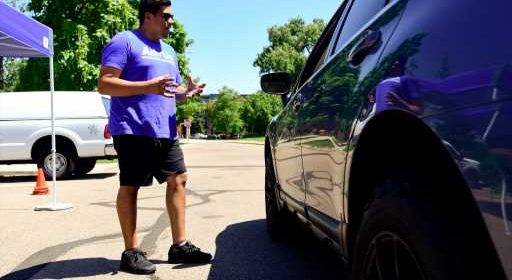All of Us program seeking 1 million people’s DNA for research to stop in Denver

A federal program building a database of 1 million people’s health information will stop in Denver twice in the next month to recruit residents who wouldn’t normally be involved in medical research.
The All of Us program, run by the National Institutes of Health, is an attempt to gather information about how genetics, habits and the environment influence the odds of disease in a diverse group. About 519,000 people have participated on some level, including 1,900 in Colorado.
A mobile unit will be at Montbello Community Health Center from 10 a.m. to 4 p.m. Monday through Friday. It will also stop at Lowry Family Health Center during the same hours from Aug. 29 to Sept. 2. Appointments aren’t required, and people who stop by to ask questions aren’t obligated to participate.
The unit previously stopped in Longmont and Louisville this year, to try to reach a broader population, said Mae Sandberg, an engagement counselor and strategist working on All of Us. People who can’t easily get to a site can also sign up on the All of Us website and ask for a saliva testing kit if they want to share their DNA, she said.
“Residents of the state of Colorado have been greatly underrepresented in clinical research,” she said. “The program is called All of Us, so we’d like to see everyone show up.”
A lack of diversity in research and clinical trials has been a hurdle to coming up with new treatments, because the population that can navigate the system and enroll is disproportionately white, male, affluent, highly educated and urban. That means that researchers may miss important signals, such as that some people metabolize a drug differently, or that a gene that seems like an important risk factor in one population means very little in another.
“If you say that a medicine is effective, you have to look at who is it effective for,” Sandberg said.
So far, just under half of All of Us participants are white, almost one-fifth are Black and about 17% are Hispanic. About three-fifths are women.
Everyone who signs up answers a few questions about their general health. They can also take surveys about their access to health care, habits and family history, and are asked if they want to allow researchers to pull some information from their electronic health record. They can choose whether to give blood or urine for genetic testing, and to have measurements like their blood pressure and weight taken.
The idea is that with detailed information about such a large group of people, researchers can study how genetics, environment and lifestyle choices contribute to (or prevent) a variety of diseases. The National Institutes of Health isn’t studying the participants themselves, but makes the data available to researchers who’ve agreed to follow ethics and confidentiality rules. Identifying information is stripped out, so researchers could see that a genetic sequence belongs to a Colorado woman, for example, but not connect it to a name.
This kind of data can’t prove what causes or prevents diseases, but it’s useful for testing out theories. For example, if scientists think that a particular gene is an important contributor to diabetes risk, but find people with that gene variant aren’t more likely to be diagnosed with diabetes, then they know to rethink that idea. If they do see a link, that’s further evidence something important might be happening with that gene, and they can design experiments to learn more.
People who give their genetic information can sign up to be notified if they have a gene that could cause a disease they can take steps to prevent or mitigate, or if their DNA is likely to influence how well certain medications work. They also can opt to learn about their likely ancestry, though unlike some genetic testing companies, the program doesn’t connect them to possible relatives.
If someone would rather not know about their disease risk, they don’t have to receive that information, Sandberg said. Those who do and learn they have a risky variant will be connected to a genetic counselor to plan if they need more disease screenings, she said.
In the long run, the idea is that individuals’ care will be guided by their genetics and environments. That largely hasn’t happened yet, though “precision medicine” is increasingly important in cancer care, as drugs are developed to target specific mutations in tumors. Still, there’s enough data to help people make decisions about when to get screened or which medications might work for them, Sandberg said.
“Who they are as individuals matters in medical research,” she said. “It should not be a privilege to know about your ancestry or your health.”
Subscribe to bi-weekly newsletter to get health news sent straight to your inbox.
Source: Read Full Article
